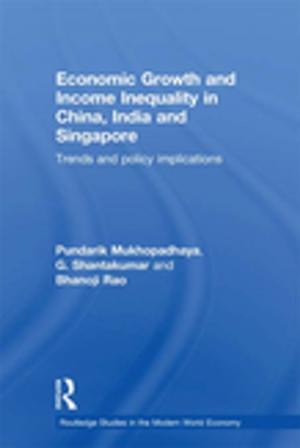Guerrilla Warfare
A Historical and Critical Study
Nonfiction, Science & Nature, Technology, Military Science, Social & Cultural Studies, Political Science| Author: | Walter Laqueur | ISBN: | 9781351516570 |
| Publisher: | Taylor and Francis | Publication: | July 28, 2017 |
| Imprint: | Routledge | Language: | English |
| Author: | Walter Laqueur |
| ISBN: | 9781351516570 |
| Publisher: | Taylor and Francis |
| Publication: | July 28, 2017 |
| Imprint: | Routledge |
| Language: | English |
As the author makes clear, every book has a history; Guerrilla Warfare is no exception. Together with its sequel Terrorism (and two companion readers) it was part of a wider study: to give a critical interpretation of guerrilla and terrorism theory and practice throughout history. It did not aim at providing a general theory of political violence, nor did it give instructions on how to conduct guerrilla warfare and terrorist operations. Its aim remains to bring about greater semantic and analytic clarity, and to do so at psychological as well as political levels.While the word guerrilla has been very popular, much less attention has been given to guerrilla warfare than to terrorism - even though the former has been politically more successful. The reasons for the lack of detailed attention are obvious: guerrilla operations take place far from big cities, in the countryside, in remote regions of a nation. In such areas there are no film cameras or recorders.In his probing new introduction, Laqueur points out that a review of strategies and the fate of guerrilla movements during the last two decades show certain common features. Both mainly concerned nationalists fighting for independence either against foreign occupants or against other ethnic groups within their own country. But despite the many attempts, only in two placesAfghanistan and Chechnya were the guerrillas successful.According to Laqueur historical experience demonstrates that guerrilla movements have prevailed over incumbents only in specific conditions. Due to a constellation of factors, ranging from modern means of observation to increase in firepower. The author suggests that we may witness a combination of political warfare, propaganda, guerrilla operations and terrorism. In such cases, this could be a potent strategy for unsponsored revolutionary change. But either as social history or military strategy this work remains a crucial work of our times.
As the author makes clear, every book has a history; Guerrilla Warfare is no exception. Together with its sequel Terrorism (and two companion readers) it was part of a wider study: to give a critical interpretation of guerrilla and terrorism theory and practice throughout history. It did not aim at providing a general theory of political violence, nor did it give instructions on how to conduct guerrilla warfare and terrorist operations. Its aim remains to bring about greater semantic and analytic clarity, and to do so at psychological as well as political levels.While the word guerrilla has been very popular, much less attention has been given to guerrilla warfare than to terrorism - even though the former has been politically more successful. The reasons for the lack of detailed attention are obvious: guerrilla operations take place far from big cities, in the countryside, in remote regions of a nation. In such areas there are no film cameras or recorders.In his probing new introduction, Laqueur points out that a review of strategies and the fate of guerrilla movements during the last two decades show certain common features. Both mainly concerned nationalists fighting for independence either against foreign occupants or against other ethnic groups within their own country. But despite the many attempts, only in two placesAfghanistan and Chechnya were the guerrillas successful.According to Laqueur historical experience demonstrates that guerrilla movements have prevailed over incumbents only in specific conditions. Due to a constellation of factors, ranging from modern means of observation to increase in firepower. The author suggests that we may witness a combination of political warfare, propaganda, guerrilla operations and terrorism. In such cases, this could be a potent strategy for unsponsored revolutionary change. But either as social history or military strategy this work remains a crucial work of our times.















